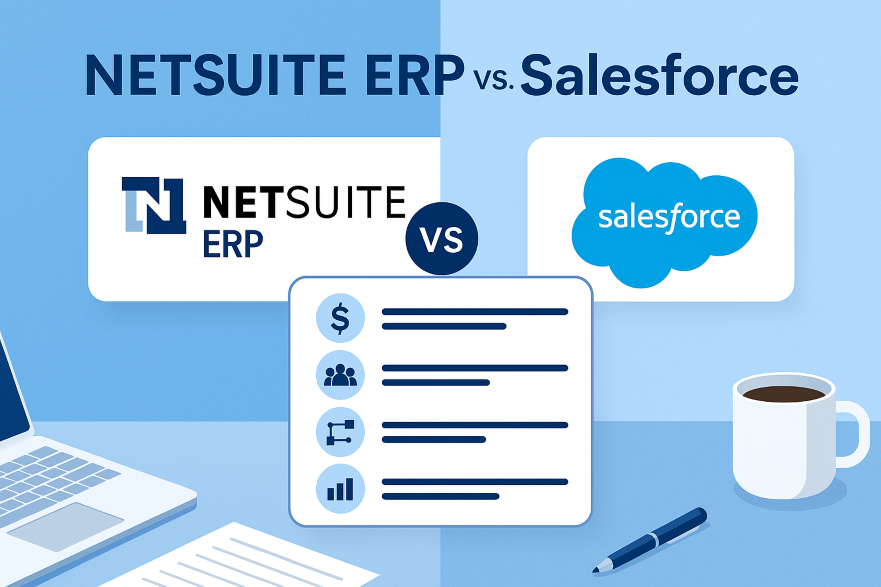NetSuite ERP vs. Salesforce: Which is the Right Solution for Your Business?

Choosing the right enterprise software is a strategic decision that directly impacts business efficiency and growth. NetSuite ERP vs. Salesforce: Which is the Right Solution for Your Business? This comparison explores key aspects such as features, pricing, scalability, and integration to help business leaders make an informed decision.
Overview of NetSuite ERP and Salesforce
NetSuite ERP: Unified Enterprise Resource Planning
- Developed by Oracle
- Includes finance, HR, procurement, order management, inventory, and CRM
- Offers end-to-end business process automation
- Real-time operational and financial visibility
- Built for multi-entity and multi-location businesses
Salesforce: Leading CRM Platform
- Renowned for customer relationship management
- Expands to marketing, analytics, and app development
- Supports customization via AppExchange
- Scalable cloud platform for diverse industries
Core Functionalities Comparison
Business Process Coverage
- NetSuite ERP delivers a full-suite solution for finance, supply chain, and operations.
- Salesforce focuses on CRM with extensions into ERP through integrations.
Verdict: NetSuite ERP vs. Salesforce – NetSuite suits companies needing end-to-end ERP, while Salesforce is ideal for sales-driven organizations.
Customization and Flexibility
- NetSuite ERP offers SuiteScript and SuiteFlow for deep customization.
- Salesforce provides low-code tools and extensive AppExchange apps.
Verdict: For CRM-specific customization, Salesforce offers more agility.
Integration Capabilities
- NetSuite ERP supports REST and SOAP APIs with native integrations (e.g., Shopify, Avalara).
- Salesforce offers extensive integrations and developer resources.
Verdict: Both are strong, but Salesforce benefits from a vast integration ecosystem.
Reporting and Analytics
- NetSuite ERP provides dashboards, KPIs, and SuiteAnalytics.
- Salesforce offers Einstein Analytics and powerful CRM reporting tools.
Verdict: NetSuite ERP is better for financial analytics, while Salesforce excels in sales and customer insights.
Scalability and Globalization
- NetSuite ERP supports multi-currency, multi-language, and multi-subsidiary operations.
- Salesforce is scalable globally but limited in native ERP capabilities.
Verdict: NetSuite ERP vs. Salesforce – NetSuite is ideal for global ERP standardization.
Pricing Structure
- NetSuite ERP: Subscription model; pricing varies by modules and users; quote-based.
- Salesforce: Tiered pricing; transparent base costs, add-ons increase the total expense.
Verdict: Salesforce is more transparent, but NetSuite ERP vs. Salesforce often shows NetSuite delivers more ERP value in a single license.
Implementation and Support
- NetSuite ERP: Uses SuiteSuccess for industry-specific deployments; partner-led support.
- Salesforce: Wide network of consultants; Trailhead for self-learning.
Verdict: Salesforce has a gentler learning curve; NetSuite ERP may need more technical involvement.
Ideal Use Cases
Platform | Best For |
NetSuite ERP | Mid to large businesses needing integrated ERP |
Salesforce | Organizations focusing on sales, customer service, and CRM |
Summary: NetSuite ERP vs. Salesforce – Which One Fits Best?
NetSuite ERP vs. Salesforce: Which is the Right Solution for Your Business? The answer depends on your company’s priorities. NetSuite ERP is better suited for enterprises looking for a unified system to manage financials, supply chain, and operations. Salesforce is ideal if CRM and customer experience are your primary focus.
Summary for Quick Reference:
- NetSuite ERP = All-in-one ERP system
- Salesforce = Industry-leading CRM solution
- NetSuite is stronger in finance, supply chain, operations
- Salesforce dominates in CRM, marketing, and customer service
- NetSuite ERP vs. Salesforce: Choose based on core business needs
- NetSuite ERP supports multi-subsidiary, multi-currency operations
- Salesforce excels in flexibility and user interface customization
- NetSuite requires more IT involvement for customization
- Salesforce offers better third-party integrations
- NetSuite ERP vs. Salesforce – No one-size-fits-all answer; evaluate priorities
Looking for expert consultation on NetSuite ERP implementation or Salesforce integration?
Contact Tech i-vin Technology – your trusted partner for ERP and CRM success.
